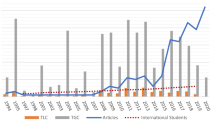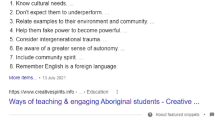Abstract
With a decade passing since the release of the Next Generation Science Standards (NGSS), it is timely to reflect and consider the extent to which the promise of science teaching and learning that values and centers learners’ varied epistemologies for scientific sensemaking has been realized. We argue that this potential, in part, lies in the hands of our science education research community becoming aware and intentional with how we situate learners’ language-related resources and practices in our work. Hoping to achieve a more inclusive and expansive future where science is for and by all—re-imagining what is possible in science education—we propose science education research move toward a language for science perspective. When taking up this perspective, researchers center the diverse ways that learners adopt and draw upon wide-ranging language resources and practices to explore phenomena, engage in scientific sensemaking and express evolving understandings about our natural world. In this commentary, we describe how we conceptualize a language for science perspective and why we believe such a perspective is critical for carrying out transformative equity-oriented research. We also illustrate one way that this perspective might be taken up, specifically in the context of science education research that integrates translanguaging theory and pedagogy to explore multilingual learners’ scientific sensemaking experiences. Though our commentary is framed within the context of realizing reform-oriented science teaching and learning in the USA, the argument we make is central to the discipline of science and thus is relevant for science education research conducted across the globe.
Similar content being viewed by others
References
Andersen, S., Méndez Pérez, K., & González-Howard, M. (2022). Reimagining science lessons through translanguaging: Supporting multilingual students’ scientific sensemaking in the context of science and engineering practices. Science Scope, 46(2), 25–31. https://doi.org/10.1080/08872376.2022.12291503
Bang, M., Brown, B., Calabrese Barton, A., Rosebery, A., & Warren, B. (2017). Toward more equitable learning in science: expanding relationships among students, teachers, and science practices. In C. V. Schwarz, C. Passmore, & B. J. Reiser (Eds.), Helping students make sense of the world using next generation science and engineering practices (pp. 33–58). National Science Teachers Association.
Bang, M., Warren, B., Rosebery, A. S., & Medin, D. (2012). Desettling expectations in science education. Human Development, 55(5–6), 302–318. https://doi.org/10.1159/000345322
Brown, B. A. (2019). Science in the city: Culturally relevant STEM education. Harvard Education Press.
Brown, B. A. (2006). “It isn’t no slang that can be said about this stuff”: Language, identity, and appropriating science discourse. Journal of research in science teaching, 43(1), 96–126. https://doi.org/10.1002/tea.20096
Fine, C. G. M., & Furtak, E. M. (2020). A framework for science classroom assessment task design for emergent bilingual learners. Science Education, 104(3), 393–420. https://doi.org/10.1002/sce.21565
Flores, N., & Rosa, J. (2015). Undoing appropriateness: Raciolinguistic ideologies and language diversity in education. Harvard Educational Review, 85(2), 149–171. https://doi.org/10.17763/0017-8055.85.2.149
García, O., & Wei, L. (2014). Language, bilingualism and education. Translanguaging: Language, bilingualism and education (pp. 46–62). Palgrave Pivot. https://doi.org/10.1057/9781137385765_4
González-Howard, M., Andersen, S., Méndez Pérez, K., & Suárez, E. (2023). Language views for scientific sensemaking matter: A synthesis of research on multilingual students’ experiences with science practices through a translanguaging lens. Educational Researcher, 52(9), 570–579. https://doi.org/10.3102/0013189X231206172
González-Howard, M., & Suárez, E. (2021). Retiring the term English language learners: Moving toward linguistic justice through asset-oriented framing. Journal of Research in Science Teaching, 58(5), 749–752. https://doi.org/10.1002/tea.21684
Grapin, S. (2019). Multimodality in the new content standards era: Implications for English learners. TESOL Quarterly, 53(1), 30–55. https://doi.org/10.1002/tesq.443
Grapin, S., Pierson, A., González-Howard, M., Ryo, M., Fine, C., & Vogel, S. (2023). Science education with multilingual learners: Equity as access and equity as transformation. Science Education, 107(4), 999–1032. https://doi.org/10.1002/sce.21791
Gutiérrez, R. (2009). Framing equity: Helping students “play the game” and “change the game.” Teaching for Excellence and Equity in Mathematics, 1(1), 4–8.
Karlsson, A., Nygård Larsson, P., & Jakobsson, A. (2020). The continuity of learning in a translanguaging science classroom. Cultural Studies of Science Education, 15, 1–25. https://doi.org/10.1007/s11422-019-09933-y
Lee, O., & Stephens, A. (2020). English learners in STEM subjects: Contemporary views on STEM subjects and language with English learners. Educational researcher, 49(6), 426–432. https://doi.org/10.3102/0013189X20923708
Lemmi, C., Brown, B. A., Wild, A., Zummo, L., & Sedlacek, Q. (2019). Language ideologies in science education. Science Education, 103(4), 854–874. https://doi.org/10.1002/sce.21508
Lemmi, C., Pérez, G., & Brown, B. A. (2021). Translanguaging in the science classroom: drawing on students’ full linguistic repertoires in bi-/multilingual settings. Translanguaging in science education (pp. 87–98). Cham: Springer. https://doi.org/10.1007/978-3-030-82973-5_5
Maxwell-Reid, C. (2020). Classroom discourse in bilingual secondary science: Language as medium or language as dialectic? International Journal of Bilingual Education and Bilingualism, 23(4), 499–512. https://doi.org/10.1080/13670050.2017.1377683
Miller, E., Manz, E., Russ, R., Stroupe, D., & Berland, L. (2018). Addressing the epistemic elephant in the room: Epistemic agency and the next generation science standards. Journal of Research in Science Teaching, 55(7), 1053–1075. https://doi.org/10.1002/tea.21459
National Research Council. (2012). A framework for K-12 science education: practices, crosscutting concepts, and core ideas. National Academies Press.
NGSS Lead States. (2013). Next generation science standards: for states, by states. National Academies Press.
Odden, T. O. B., & Russ, R. S. (2019). Defining sensemaking: Bringing clarity to a fragmented theoretical construct. Science Education, 103(1), 187–205. https://doi.org/10.1002/sce.21452
Ojalehto, B. I., Medin, D. L., Horton, W. S., Garcia, S. G., & Kays, E. G. (2015). Seeing cooperation or competition: Ecological interactions in cultural perspectives. Topics in Cognitive Science, 7(4), 624–645. https://doi.org/10.1111/tops.12156
Otheguy, R., García, O., & Reid, W. (2015). Clarifying translanguaging and deconstructing named languages: A perspective from linguistics. Applied Linguistics Review, 6(3), 281–307. https://doi.org/10.1515/applirev-2015-0014
Pérez, G., González-Howard, M., & Suárez, E. (2022). Call for papers: Journal of Research in Science Teaching—Special issue on “examining translanguaging in science and engineering education research.” Journal of Research in Science Teaching, 59(9), 1733–1735. https://doi.org/10.1002/tea.21825
Pierson, A. E., Clark, D. B., & Brady, C. E. (2021). Scientific modeling and translanguaging: A multilingual and multimodal approach to support science learning and engagement. Science Education, 105(4), 776–813. https://doi.org/10.1002/sce.21622
Pierson, A. E., & Grapin, S. E. (2021). A disciplinary perspective on translanguaging. Bilingual Research Journal, 44(3), 318–334. https://doi.org/10.1080/15235882.2021.1970657
Russ, R. S. (2014). Epistemology of science vs. epistemology for science. Science Education, 98(3), 388–396. https://doi.org/10.1002/sce.21106
Siry, C., Wilmes, S., te Heesen, K., Sportelli, D., & Heinericy, S. (2022). Young children’s transmodal participation in science investigations: drawing on a diversity of resources for meaning-making. Translanguaging in science education (pp. 61–85). Springer. https://doi.org/10.1007/978-3-030-82973-5_4
Suárez, E. (2020). “Estoy explorando science”: Emergent bilingual students problematizing electrical phenomena through translanguaging. Science Education, 104(5), 791–826. https://doi.org/10.1002/sce.21588
Takeuchi, M. A., Kayumova, S., de Araujo, Z., & Madkins, T. C. (2022). Going beyond #RetireELL: A call for anti-colonial approaches to languages in STEM education. Journal of Research in Science Teaching, 59(5), 876–879. https://doi.org/10.1002/tea.21764
Warren, B., Ballenger, C., Ogonowski, M., Rosebery, A. S., & Hudicourt-Barnes, J. (2001). Rethinking diversity in learning science: The logic of everyday sense-making. Journal of Research in Science Teaching, 38(5), 529–552. https://doi.org/10.1002/tea.1017
Warren, B., Vossoughi, S., Rosebery, A. S., Bang, M., & Taylor, E. V. (2020). Multiple ways of knowing: re-imagining disciplinary learning. Handbook of the cultural foundations of learning (pp. 277–294). Routledge. https://doi.org/10.4324/9780203774977-19
Acknowledgements
This work was supported by the National Science Foundation under NSF Grant # 1942912—CAREER: Developing elementary preservice teachers’ understandings and abilities to support emerging bilingual students’ scientific sensemaking. Any opinions expressed in this work are those of the authors and do not necessarily represent those of the funding agency, The University of Texas at Austin, or Boston College.
Author information
Authors and Affiliations
Contributions
All authors equally conceptualized, wrote, reviewed and revised the manuscript.
Corresponding author
Ethics declarations
Competing interests
The authors declare no competing interests.
Additional information
Publisher's Note
Springer Nature remains neutral with regard to jurisdictional claims in published maps and institutional affiliations.
Lead Editor: C. Milne.
Rights and permissions
Springer Nature or its licensor (e.g. a society or other partner) holds exclusive rights to this article under a publishing agreement with the author(s) or other rightsholder(s); author self-archiving of the accepted manuscript version of this article is solely governed by the terms of such publishing agreement and applicable law.
About this article
Cite this article
González-Howard, M., Andersen, S., Méndez Pérez, K. et al. Re-imagining science education research toward a language for science perspective. Cult Stud of Sci Educ (2024). https://doi.org/10.1007/s11422-024-10213-7
Received:
Accepted:
Published:
DOI: https://doi.org/10.1007/s11422-024-10213-7




